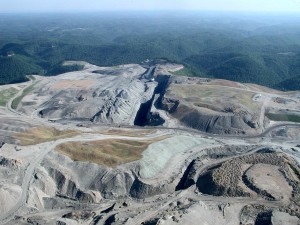Ruling Finds State Failed to Hold Coal Industry Accountable for Water Pollution, at Expense of Environment and Communities
RICMOND, VA – Today the United States Court of Appeals for the Fourth Circuit issued an opinion affirming that a West Virginia coal mine violated the Clean Water Act when it discharged toxic pollution into nearby waterways. The opinion affirms an earlier decision by the U.S. District Court for the Southern District of West Virginia. The opinion flatly rejected efforts by the state of West Virginia to ignore the overwhelming evidence that high conductivity mining pollution harms stream life and therefore violated the Clean Water Act. It is a significant step forward in ensuring that clean water safeguards are upheld and enforced in order to protect the health and economies of local communities, in spite of inaction by state officials.
The case, originally filed in March 2013, alleged that mine runoff from a Fola Coal operation in Clay and Nicholas Counties, West Virginia, contaminated water in Stillhouse Branch with sulfate and other ionic pollutants that make those waterways toxic to stream life. The citizen groups that brought this case claimed that the mines were violating “narrative” water quality standards established in the Clean Water Act, which prohibit water pollution that causes harm to stream life or has significant adverse impacts on streams. This suit was brought by citizen groups including the Sierra Club, Ohio Valley Environmental Coalition, and West Virginia Highlands Conservancy.
“For years, the state of West Virginia has failed to hold the coal industry accountable for polluting our streams, and our communities have paid the price,” said Bill Price, an organizer for the Sierra Club based in West Virginia. “Today’s opinion rejects those efforts and both reinforces the central protections of our environmental laws such as the Clean Water Act, and also restores the role of sound science in regulating coal mines and other industries. This opinion recognizes that these safeguards play a critical role in protecting the environment and the economy, and should be enforced no matter who is in the seat of power. ”
The Court of Appeals affirmed the District Court decision finding that there are significant levels of conductivity pollution downstream from Fola Coal’s mining operation. The court also found that mining activities cause this conductivity pollution and that conductivity in streams below these mines can be as much as 10 times above safe levels for local stream life. Compliance with narrative water standards is typically determined by taking field measurements of the number and diversity of aquatic life in the stream, rather than by only measuring the amount of chemicals in the discharged water. The streams affected by the water pollution in this case were found to have significant damage to stream life compared to unpolluted streams.
“This is a major victory for anyone in West Virginia who wants to enjoy their human right to clean water for generations to come,” said Cindy Rank of West Virginia Highlands Conservancy. “It also confirms what the science overwhelmingly demonstrates: that coal mines across Appalachia are harming streams with conductivity pollution. The Court’s opinion emphasizes the ongoing failure of West Virginia’s elected officials to respond to this crisis. We hope to see continued action taken to keep West Virginia families and their communities safe.”
“We are very pleased to see the Court of Appeals hold Fola accountable for its violations of the Clean Water Act,” said Dianne Bady with Ohio Valley Environmental Coalition. “We’re equally pleased that the Court saw through West Virginia’s transparent efforts to undermine our key environmental protections. We hope that West Virginia will take this decision to heart and work harder to protect our environment and our communities.”
The citizen groups Sierra Club, West Virginia Highlands Conservancy, and Ohio Valley Environmental Coalition are represented in this case by attorneys with Public Justice and Appalachian Mountain Advocates.








